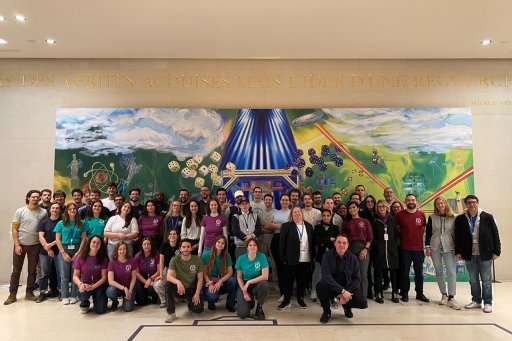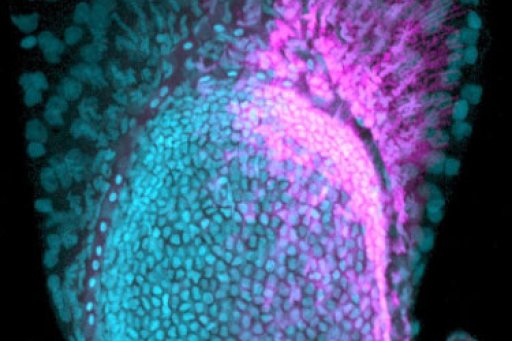![[alt_b0a39eb3-aaae-4b97-9a4f-a3f72682daa5]](/media/chercheurs/UPL8800036667929636626_Pierre_Emmanuel_Girault_Sotias.jpg)
Have you always been passionate about medical research ?
Yes, originally I did a first year of medical studies, which I didn't pass... which happens to a lot of students ! But it was a positive experience. Given my great interest in biology, from how cells communicate with each other, to how organs function and interact within the body, I decided to take a Biology-Health course at the University of Paris-Saclay. This course focuses in particular on human physiology, which is the study of the properties, functions and regulation of our organs and tissues.
My first internship at INRA focused on the sense of smell, and more specifically on the functioning of the olfactory bulb. I then continued my studies and during my Master's degree 2, a researcher, Dr. Catherine Llorens-Cortes, gave a lecture on her research subject : vasopressin (anti-diuretic hormone) and apelin, two hormones with opposing effects on the kidney, a bit like yin and yang. I really liked the lecture, so I contacted her again to ask for an internship... and she accepted me onto her team at the Collège de France. Thanks to funding from the Fondation pour la Recherche Médicale, I was able to continue my studies with a thesis in the cardiovascular field.
What theme were you working on when you started ?
When I joined Dr Llorens-Cortes' team as a Master's student at 2, I was supervised by her and by Dr Adrien Flahault, a nephrologist who was doing a thesis in the laboratory on hyponatremia. Hyponatremia is a disorder characterized by a drop in sodium concentration in the blood, caused by an excess of water, which is normally finely regulated.
The kidneys control the amount of water in the body : they filter around 180 L of blood every day, so our blood passes through them dozens of times a day ! Their role is to eliminate waste and maintain a good balance between water and mineral salts in the body.
If you don't drink enough water during the day, your urine will be very dark, as the kidneys concentrate the urine by reabsorbing water during filtration. Conversely, if you drink a lot of water, your urine will be very clear, as your kidneys reduce water reabsorption and eliminate excess water in the urine.
In the case of hyponatremia, a large quantity of vasopressin is released, which induces water reabsorption in the kidneys: excess water ends up in the body. This water retention leads to dilution of blood sodium. People store water, but continue to eat and drink anyway : it's a vicious circle. The causes of this disorder can be multiple, and its common symptoms are nausea, confusion, headaches and, when more severe, vomiting, cardio-respiratory failure, hypersomnolence, convulsions or even coma.
How is excess water treated ?
Once the causes of hyponatremia have been determined, the first line of treatment is water restriction : non-essential fluid intake must be limited. If hyponatremia persists despite these restrictions, specific vasopressin receptor antagonists (vaptans) are used as a second-line treatment.
Their molecular action is to take the place of vasopressin at the level of its receptor. Vasopressin can thus no longer bind to its receptor and trigger the molecular cascade that ultimately leads to water reabsorption.
However, vaptans are very fast-acting. Correcting hyponatremia too quickly can be dangerous, as abrupt ionic and water movements between cellular media can cause neurological damage. In addition, this treatment creates great discomfort for patients who, after taking the medication, see their urine volume increase and have to go to the toilet very often, even in the middle of the night. At the same time, they spend their time drinking, as they feel dehydrated.
![[alt_b61c0796-6dab-4751-a37f-2ad73e493d4c]](/media/chercheurs/UPL4615477001657833588_Labo_PE_Girault_Sotias.jpg)
How has your team helped you ?
In my team, led by my PhD supervisor and made up of around ten people, in collaboration with a team of chemists headed by Dr. Dominique Bonnet, we evaluated apelin, a peptide - a kind of small protein - naturally present in the body in a model of hyponatremia. The half-life of apelin in the bloodstream is extremely short. The one we have developed and used has been stabilized to improve its pharmacological function and duration of action.
We have demonstrated that this stabilized apelin also counteracts the action of vasopressin and thus eliminates excess water, helping to increase sodium concentration in the blood. This treatment would appear to be better tolerated than vaptans, since it leads to a more gradual correction of hyponatremia and less thirst.
You and your team have found another application for this molecule..
Apelin had been described in the literature as playing an important role in the control of cardiovascular functions. As a researcher in the laboratory, Dr Solène Boitard, was working on the effects of another molecule in the treatment of heart failure after myocardial infarction, we became interested in the role of apelin in heart failure.
The heart is the body's pump. Its role is to send blood throughout the body and meet the oxygen and nutrient needs of all the organs. When the heart is no longer able to do this properly, we speak of heart failure.
Heart failure can have several origins, including heart attack, also known as " myocardial infarction " : the heart is no longer supplied with oxygen because one or more coronary arteries are blocked, often by a blood clot. All heart cells downstream of the obstructed area are then deprived of oxygen and die. After suffering this irreversible damage, the heart muscle will no longer have the same contraction force, and will no longer send enough blood to the body. The heart will initially try to adapt by " remodeling ".
For example, the heart will force the overproduction of vasopressin, which will cause the kidneys to reabsorb water, thereby increasing blood volume - just as happens in hyponatremia! Heart rate will also increase.
Why is this harmful for patients ?
The problem is that when the heart tries to remodel itself, it actually tires even more, which makes the situation worse. Patients are constantly tired, get out of breath at the slightest effort, and put on weight because of water retention.
To treat heart failure, doctors currently prescribe a number of drugs. Their action is either : to strengthen and support the work of the heart, to soften the blood vessels - or vasodilatation, or to increase the elimination of water and salt by the kidneys to reduce water retention.
Considering all these effects, I have studied, with Drs Flahault and Boitard, the effects of stabilized apelin :
1) on the vessels, and we observed that it leads to vasodilatation.
2) on cardiac function, and we have shown that it improves cardiac contractility.
3) in addition, as described above, stabilized apelin has a diuretic effect.
So this molecule would have several beneficial effects in treating heart failure.
We then tested stabilized apelin in an experimental model of heart failure following myocardial infarction. We observed a clear improvement in cardiac function in the presence of this compound. Publication of the results is in preparation. This may offer hope for future treatment !
You'll soon be defending your thesis. What's your next step?
I'm off to Canada for a post-doctorate at CHU Sainte-Justine in the neonatology department of Dr. Anne-Monique Nuyt. Among other things, I'll be studying the causes of the development of cardiac malformations in individuals born very prematurely.
I've really enjoyed my time at the Collège de France over the last few years, because it's a multidisciplinary place, which is extremely stimulating. You realize that the world of science is much broader than your own field.
There's also a lot of exchange between doctoral students and post-docs at the Collège de France, on our subjects and our progress, despite the disparity of our respective themes. It's a bit like a big family. It also provides moral support, especially when experiments don't work out at first !
Dealing with setbacks and getting back on track is an inherent part of being a scientist. You're constantly questioning your research. And in the end, that's what makes it so exciting ! It's like when you're climbing: you don't just go for it, but break down your route... and then, if you can't manage to climb, you can talk to other climbers nearby to get their points of view. In an experimental protocol, it's the same: we break down our thoughts ; if we get stuck, we can count on the outside view of other researchers to help us see things more clearly : these are real moments of sharing.
----------
Pierre-Emmanuel Girault-Sotias works at CIRB, in the Central Neuropeptides and Hydric and Cardiovascular Regulation team, headed by Catherine Llorens-Cortes. Her thesis is entitled " Metabolically stable apelin analogues in the treatment of hyponatremia and heart failure after myocardial infarction ".
Photos © Patrick Imbert
Interview by Océane Alouda








